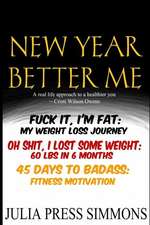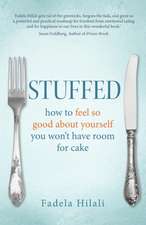Starting Monday: Seven Keys to a Permanent, Positive Relationship with Food
Autor Karen R. Koenigen Limba Engleză Paperback – 4 noi 2013
Starting Monday is based on the simple premise that when our behaviors don’t align with our expressed intentions, we’ve got a conflict going on, often outside of our awareness. The book helps readers dig deeply into their psyches to figure out what mistaken beliefs and needless fears are holding them back from achieving their health and fitness goals. The polarized feelings for disregulated eaters to identify and resolve fall within these seven key areas: 1) create lasting change, 2) making conscious choices, 3) feel deserving, 4) how to comfort themselves, 5) know what's enough, 6) manage intimacy, and 7) developing a healthy identity.
Starting Monday first helps readers unearth their mixed feelings in these seven areas, then teaches them how to change their beliefs and behaviors to resolve them. Using humor, plain talk, examples from her clinical experience, reflection exercises, case studies, and homework, Koenig lets troubled eaters know that their yo-yo patterns of eating and self care are due to conflicts. She shies away from easy answers and, instead, provides hope and concrete actions to developing a permanent, positive relationship with food.
Starting Monday first helps readers unearth their mixed feelings in these seven areas, then teaches them how to change their beliefs and behaviors to resolve them. Using humor, plain talk, examples from her clinical experience, reflection exercises, case studies, and homework, Koenig lets troubled eaters know that their yo-yo patterns of eating and self care are due to conflicts. She shies away from easy answers and, instead, provides hope and concrete actions to developing a permanent, positive relationship with food.
Preț: 103.70 lei
Nou
Puncte Express: 156
Preț estimativ în valută:
19.84€ • 20.77$ • 16.42£
19.84€ • 20.77$ • 16.42£
Carte disponibilă
Livrare economică 17-31 martie
Preluare comenzi: 021 569.72.76
Specificații
ISBN-13: 9780936077789
ISBN-10: 0936077786
Pagini: 287
Dimensiuni: 137 x 213 x 20 mm
Greutate: 0.41 kg
Editura: G'Urze Books
ISBN-10: 0936077786
Pagini: 287
Dimensiuni: 137 x 213 x 20 mm
Greutate: 0.41 kg
Editura: G'Urze Books
Cuprins
Introduction
Barriers to “Normal” Eating
1 - Why It’s Hard to Change Our Eating
(Help, My Mouth Has A Mind Of Its Own!)
2 - Reasons We Want to Eat “Normally”
(Stop Me When I Get To Infinity!)
3 - How Internal Conflicts Prevent Us From Eating “Normally”
(In This Corner We Have Me and In This Corner We Have—Me!)
The Seven Keys
4 - Create Lasting Change
(Can’t I Just Wish Upon A Star?)
5 - Make Conscious Choices
(How Come When I Lash Out, I Hit Me?)
6 - Feel Deserving
(When I’m Good I’m Very, Very Good and When I’m Bad I Head For The Fridge!)
7 - Comfort Yourself Effectively
(I’m Better At Licking The Bowl Than My Problems!)
8 - Know What’s Enough
(Is Enough Ever Really Enough?)
9 - Manage Intimacy
(Can’t I Be A Super Attractive Invisible Person?)
10 - Develop a Healthy Identity
(If I Say Goodbye To My Identity, Will It Miss Me?)
Conclusion
11 - Resolving Internal Conflicts for Good
(I’m Gonna Sit Here And Break Bread With Myself!)
Barriers to “Normal” Eating
1 - Why It’s Hard to Change Our Eating
(Help, My Mouth Has A Mind Of Its Own!)
2 - Reasons We Want to Eat “Normally”
(Stop Me When I Get To Infinity!)
3 - How Internal Conflicts Prevent Us From Eating “Normally”
(In This Corner We Have Me and In This Corner We Have—Me!)
The Seven Keys
4 - Create Lasting Change
(Can’t I Just Wish Upon A Star?)
5 - Make Conscious Choices
(How Come When I Lash Out, I Hit Me?)
6 - Feel Deserving
(When I’m Good I’m Very, Very Good and When I’m Bad I Head For The Fridge!)
7 - Comfort Yourself Effectively
(I’m Better At Licking The Bowl Than My Problems!)
8 - Know What’s Enough
(Is Enough Ever Really Enough?)
9 - Manage Intimacy
(Can’t I Be A Super Attractive Invisible Person?)
10 - Develop a Healthy Identity
(If I Say Goodbye To My Identity, Will It Miss Me?)
Conclusion
11 - Resolving Internal Conflicts for Good
(I’m Gonna Sit Here And Break Bread With Myself!)
Recenzii
BOOK REVIEW:
Synopsis: "Starting Monday" is based on the simple premise that when our behaviors don't align with our expressed intentions, we've got a conflict going on, often outside of our awareness. Author Laren R. Koenig helps her readers dig deeply into their psyches to figure out what mistaken beliefs and needless fears are holding them back from achieving their health and fitness goals. The polarized feelings for disregulated eaters to identify and resolve fall within these seven key areas: 1) create lasting change, 2) making conscious choices, 3) feel deserving, 4) how to comfort themselves, 5) know what's enough, 6) manage intimacy, and 7) developing a healthy identity. "Starting Monday" first helps readers unearth their mixed feelings in these seven areas, then teaches them how to change their beliefs and behaviors to resolve them. Using humor, plain talk, examples from her clinical experience, reflection exercises, case studies, and homework, Koenig lets troubled eaters know that their yo-yo patterns of eating and self care are due to conflicts. She shies away from easy answers and, instead, provides hope and concrete actions to developing a permanent, positive relationship with food.
Critique: Informative, motivational, exceptionally well written, organized and presented, "Starting Monday: Seven Keys to a Permanent, Positive Relationship with Food" is especially recommended for anyone wanting to improve their mental and physical health through a more nutritional and balanced approach to meal time decisions. Very highly recommended and instructional reading, as well as an invaluable addition to community library Self-Help and Health/Medicine collections, "Starting Monday: Seven Keys to a Permanent, Positive Relationship with Food" is also available in a Kindle edition ($9.99).
- Small Press Bookwatch; The Midwest Book Review July 2014
BOOK REVIEW: Starting Monday: Seven Keys to a Permanent, Positive Relationship with Food by Karen Koenig LCSW, M.Ed. (Gurze Books, 2013, 288 pages) People repeatedly - but often fruitlessly - promise themselves they will finally get their eating struggles under control. When? Starting Monday! The title of Karen Koenig's book refers to this familiar resolution, and she explores why emotional eaters, filled with determination to improve their hurtful behaviors, wind up failing time after time. In this, her seventh book, Ms. Koenig offers a key approach for long lasting change: people must confront that internal part of themselves which is invested in not getting better! This is a book for those people who yearn for weight loss and body satisfaction but may have difficulty appreciating the conflicts within themselves that sabotage and defeat their best efforts. Why would someone want to derail their best efforts to be happy? Koenig shows readers how to identify "the ouch of self-recognition" and to discover what blocks normal eating. She describes seven keys to unlock your self-defeat and create lasting change: 1. apply curiosity, self reflection, and compassion to why you have been stuck. 2. make conscious choices through the mindful focus of living in the present moment. 3. feel deserving by exploring your family history which may have left you feeling unworthy or deprived. 4. comfort yourself by reaching out to others and develop strategies to cope with stress. 5. know what's enough and pinpoint where you feel unsatisfied not only with food but money, possessions, work, and relationships. 6. manage intimacy by becoming aware of your fears of closeness and your desires. 7. develop a healthy identity by claiming your most authentic self regardless of weight. What are your beliefs, your needs, your truths? In a lively, engaging style, Ms. Koenig illuminates these psychological solutions to help you get unstuck so you can live a fruitful and compassionate life every day of the week - not just Starting Monday!
Book review submitted by Mary Anne Cohen, Director of The New York Center for Eating Disorder
----------
BOOK REVIEW
Karen Koenig has written a book for anyone who has ever experienced dysfunctional eating in his or her life. It is a book that will resonate for either the person who works with people that may struggle with food and body issues, or has had issues of his/her own. (And let’s be honest, who hasn’t in the world in which we live?!) It is a must read for all social workers to better understand our own relationship with food and our bodies in order to better help our clients. This is not a book about eating disorders. But it is a book that will help anyone who strives to have a better relationship with food. Karen provides a step-by-step guidebook on how to manage your eating and emotions.
One of the aspects of Karen’s book that I love is that it is light and fun, while also providing concrete advice and helpful homework assignments. Karen uses food analogies to clearly represent her points while also showing us the connections food has to our emotions. For example, Karen speaks about “marinating” our- selves in pride or nothing “tastes” as good as pride. This spirited way of speaking to the reader is compelling and engaging!
All of Karen’s books examine our issues with food from a strength- based perspective. Instead of calling ourselves “lazy”, Karen suggests that we acknowledge having ambivalence or conflicts about our relationship with food. She teaches the reader how to reframe one’s beliefs and helps us to understand the identifiers for when we are having difficulty with “all or nothing thinking,” (for example, I am “good” if I eat fruit but “bad” if I have a cookie). We learn not only about the psychological components of our relationship with food, but also about the biology related to eating issues. This is a very important point, showing us that it is physiologically impossible to “talk our way out” of a binge. Karen reminds us that there are many areas that require further examination to have a healthy relationship with food.
Karen recognizes that our relationship with food and our body does not only have to do with our actions. The media and our peers plays a huge role in how we think about this topic. Karen challenges us to fight society’s concepts regarding “beauty” and “quick fixes”.
Reading Karen’s book feels like you are taking a class with her. Karen’s relaxed writing style is lovely. She tells us to take deep breaths and to be mindful of our response to her writing. She acknowl- edges our discomfort in beginning to deal with these issues and encourages us to take action so we can challenge some of our beliefs.
Karen asks us many provocative questions about our own relationship with food at the end of each chapter. This provides “food for thought” as we explore her questions and challenge our thoughts and beliefs. Karen believes that people can have healthy relationships with food and their bodies, and provides the reader with the tools they need to get there.
I will definitely use Karen’s book in my private practice on a regular basis. I hope you will too.
Reviewed by Beth Mayer, LICSW
PRESIDENT OF THE MULTI-SERVICE EATING DISORDER ASSOCIATION.
Synopsis: "Starting Monday" is based on the simple premise that when our behaviors don't align with our expressed intentions, we've got a conflict going on, often outside of our awareness. Author Laren R. Koenig helps her readers dig deeply into their psyches to figure out what mistaken beliefs and needless fears are holding them back from achieving their health and fitness goals. The polarized feelings for disregulated eaters to identify and resolve fall within these seven key areas: 1) create lasting change, 2) making conscious choices, 3) feel deserving, 4) how to comfort themselves, 5) know what's enough, 6) manage intimacy, and 7) developing a healthy identity. "Starting Monday" first helps readers unearth their mixed feelings in these seven areas, then teaches them how to change their beliefs and behaviors to resolve them. Using humor, plain talk, examples from her clinical experience, reflection exercises, case studies, and homework, Koenig lets troubled eaters know that their yo-yo patterns of eating and self care are due to conflicts. She shies away from easy answers and, instead, provides hope and concrete actions to developing a permanent, positive relationship with food.
Critique: Informative, motivational, exceptionally well written, organized and presented, "Starting Monday: Seven Keys to a Permanent, Positive Relationship with Food" is especially recommended for anyone wanting to improve their mental and physical health through a more nutritional and balanced approach to meal time decisions. Very highly recommended and instructional reading, as well as an invaluable addition to community library Self-Help and Health/Medicine collections, "Starting Monday: Seven Keys to a Permanent, Positive Relationship with Food" is also available in a Kindle edition ($9.99).
- Small Press Bookwatch; The Midwest Book Review July 2014
BOOK REVIEW: Starting Monday: Seven Keys to a Permanent, Positive Relationship with Food by Karen Koenig LCSW, M.Ed. (Gurze Books, 2013, 288 pages) People repeatedly - but often fruitlessly - promise themselves they will finally get their eating struggles under control. When? Starting Monday! The title of Karen Koenig's book refers to this familiar resolution, and she explores why emotional eaters, filled with determination to improve their hurtful behaviors, wind up failing time after time. In this, her seventh book, Ms. Koenig offers a key approach for long lasting change: people must confront that internal part of themselves which is invested in not getting better! This is a book for those people who yearn for weight loss and body satisfaction but may have difficulty appreciating the conflicts within themselves that sabotage and defeat their best efforts. Why would someone want to derail their best efforts to be happy? Koenig shows readers how to identify "the ouch of self-recognition" and to discover what blocks normal eating. She describes seven keys to unlock your self-defeat and create lasting change: 1. apply curiosity, self reflection, and compassion to why you have been stuck. 2. make conscious choices through the mindful focus of living in the present moment. 3. feel deserving by exploring your family history which may have left you feeling unworthy or deprived. 4. comfort yourself by reaching out to others and develop strategies to cope with stress. 5. know what's enough and pinpoint where you feel unsatisfied not only with food but money, possessions, work, and relationships. 6. manage intimacy by becoming aware of your fears of closeness and your desires. 7. develop a healthy identity by claiming your most authentic self regardless of weight. What are your beliefs, your needs, your truths? In a lively, engaging style, Ms. Koenig illuminates these psychological solutions to help you get unstuck so you can live a fruitful and compassionate life every day of the week - not just Starting Monday!
Book review submitted by Mary Anne Cohen, Director of The New York Center for Eating Disorder
----------
BOOK REVIEW
Karen Koenig has written a book for anyone who has ever experienced dysfunctional eating in his or her life. It is a book that will resonate for either the person who works with people that may struggle with food and body issues, or has had issues of his/her own. (And let’s be honest, who hasn’t in the world in which we live?!) It is a must read for all social workers to better understand our own relationship with food and our bodies in order to better help our clients. This is not a book about eating disorders. But it is a book that will help anyone who strives to have a better relationship with food. Karen provides a step-by-step guidebook on how to manage your eating and emotions.
One of the aspects of Karen’s book that I love is that it is light and fun, while also providing concrete advice and helpful homework assignments. Karen uses food analogies to clearly represent her points while also showing us the connections food has to our emotions. For example, Karen speaks about “marinating” our- selves in pride or nothing “tastes” as good as pride. This spirited way of speaking to the reader is compelling and engaging!
All of Karen’s books examine our issues with food from a strength- based perspective. Instead of calling ourselves “lazy”, Karen suggests that we acknowledge having ambivalence or conflicts about our relationship with food. She teaches the reader how to reframe one’s beliefs and helps us to understand the identifiers for when we are having difficulty with “all or nothing thinking,” (for example, I am “good” if I eat fruit but “bad” if I have a cookie). We learn not only about the psychological components of our relationship with food, but also about the biology related to eating issues. This is a very important point, showing us that it is physiologically impossible to “talk our way out” of a binge. Karen reminds us that there are many areas that require further examination to have a healthy relationship with food.
Karen recognizes that our relationship with food and our body does not only have to do with our actions. The media and our peers plays a huge role in how we think about this topic. Karen challenges us to fight society’s concepts regarding “beauty” and “quick fixes”.
Reading Karen’s book feels like you are taking a class with her. Karen’s relaxed writing style is lovely. She tells us to take deep breaths and to be mindful of our response to her writing. She acknowl- edges our discomfort in beginning to deal with these issues and encourages us to take action so we can challenge some of our beliefs.
Karen asks us many provocative questions about our own relationship with food at the end of each chapter. This provides “food for thought” as we explore her questions and challenge our thoughts and beliefs. Karen believes that people can have healthy relationships with food and their bodies, and provides the reader with the tools they need to get there.
I will definitely use Karen’s book in my private practice on a regular basis. I hope you will too.
Reviewed by Beth Mayer, LICSW
PRESIDENT OF THE MULTI-SERVICE EATING DISORDER ASSOCIATION.
Notă biografică
Karen R. Koenig, LCSW, M.Ed., is a psychotherapist, international eating coach, national educator, and popular author of four books on eating and weight. She is an expert on the psychology of eating—the how and why, not the what of it—is best known for her non-diet, eating “normal” approach to making peace with food, and has worked in the field of eating disorders for 30 years.
Her first two books set the stage for her "normal" eating series, The Rules of "Normal" Eating (Gürze Books, 2005) and The Food and Feelings Workbook, and she is also the author of What Every Therapist Needs to Know about Treating Eating and Weight Issues (Norton Professional Books, 2008) and Nice Girls Finish Fat (Simon and Schuster, 2009). Her books have been translated into 10 foreign languages.
Ms. Koenig practices in Sarasota, FL, moderates an online Food and Feelings message board, and authors two blogs.
Her first two books set the stage for her "normal" eating series, The Rules of "Normal" Eating (Gürze Books, 2005) and The Food and Feelings Workbook, and she is also the author of What Every Therapist Needs to Know about Treating Eating and Weight Issues (Norton Professional Books, 2008) and Nice Girls Finish Fat (Simon and Schuster, 2009). Her books have been translated into 10 foreign languages.
Ms. Koenig practices in Sarasota, FL, moderates an online Food and Feelings message board, and authors two blogs.
Extras
Introduction
If you’re reading this book, I’m guessing you’ve been wrestling with food for ages, even for what seems like—or has been—a lifetime. If so, hats off to you for persisting in trying to improve your eating and become healthier when the process, at times, may have felt frustrating, overwhelming, difficult, and as if it’s hardly worth the effort. I’m here to tell you it is worth the effort, but only if you’re heading down the right path.
Most disregulated eaters have had more than enough dead-end excursions into dieting, weight obsession, and the various and sundry ways of beating their psyches into submission and their bodies into shape. Each of you could probably receive an honorary degree in nutrition from all the do’s and don’ts you’ve learned about eating and could have a mega-splurge on Rodeo Drive from all the money you’ve wasted on gym memberships, still-in-the box exercise machines, and that stash of aerobic and yoga videos in the back of your closet.
Starting Monday assumes that you already know what to eat, recognize the benefits of exercise, and understand what it takes to be healthy and take good care of yourself. You’ve been paying attention all along and get what works. What you haven’t figured out yet—and what this book will teach you—is how you can be so smart and still be engaged in such an on-again-off-again relationship with food.
Sadly, the subjects of eating and weight have been treated superficially and simplistically for so many decades—remember, Just do it?—that most people don’t realize how humongously complex they actually are. There’s the whole biological aspect of appetite and weight, from hormones and brain chemistry to genetic loading and the effects of stress, environment toxins, and sleep deprivation on appetite. There the subtle and not-so-subtle messages that food is love, which often come from the profit-driven food industry cooking up and feeding us trash that seduce us into getting hooked on high-fat/salt/sugar cuisine. Additionally, don’t forget the media pressure to diet, diet, diet in order to be thin, thin, thin, which only makes us want to rush out and eat, eat, eat.
This book is about the deeper, less obvious reasons we eat when we don’t want to and don’t exercise when we do want to. It speaks to the psychological underpinnings of why we don’t want to stop overeating, bingeing, and being a couch potato. You already recognize your desire to do better with food, but how far has that knowledge gotten you—to a bookstore or a bakery? Now it’s time to learn what keeps you from pursuing and reaching your health and eating goals, which means identifying and coming to terms with the part of you that doesn’t want to pursue and reach them. Yeah, yeah, you might be shaking your heads and shouting, “I want my money back for this dumb book because the author is out of her mind. She has no idea how much I desperately want to lose weight/be thin/get healthy.” Oh, but I do. I really do. I’ve walked in your shoes and lived in your skin, but that was long ago.
I’ve been working with disregulated eaters for more than 30 years, with people who’ve lost the same bleepin’ 50 or 100 pounds over and over, are trapped in the diet-binge cycle, and have at least two or three sizes of clothing in the closet to match fluctuating weights.
I’ve written three books on eating (and one for therapists to help them understand and treat disregulated eaters), and have spent half my life teaching the skills of “normal” eating, lecturing across the country, and counseling troubled eaters around the world. I run a message board for emotional eaters and write weekly blogs. Moreover, as I said, I was once a food junkie like you wouldn’t believe. In short, I know your eating headaches and heartaches.
The progression of my books for the lay public has not been accidental. My first book, The Rules of “Normal” Eating, is a cognitive-behavioral primer on changing beliefs, feelings and behaviors that relate to food and weight. I wrote The Food & Feelings Workbook to help emotional eaters follow the rules of appetite and learn to manage feelings effectively. I consider Starting Monday as the final book in this “normal” eating trilogy Incidentally, I also wrote a related book, Nice Girls Finish Fat, which includes stories about my work with women for whom self-care is done almost exclusively with a fork or spoon.
For decades, I’ve observed how clients insist they want to be healthy and have a comfortable relationship with food, and then go out and overeat to beat the band. After a while, I couldn’t help but wonder what this paradoxical behavior is all about. As I saw more clearly how motivations often wage war with and cancel out each other, I shared my insights with clients and, lo and behold, they began to have epiphanies about how their desires and wishes around food were often mutually exclusive. They began to recognize that their stated intentions—to exercise, eat nutritiously, consume food in appropriate portions, get fit, and take good care of themselves—were light years away from their behavior of bingeing and avoiding regular physical activity.
Identifying and resolving this push-pull tension that kept them stuck in self-abusive patterns made all the difference in treatment and freed them up at last to make permanent behavioral change. Not swift change, mind you, but the kind that takes your hand and won’t let it go until it brings you safely to your destination. Realizing that their intent and behavior around food needed to align in order for success to last, created in clients an eureka moment—actually dozens of eureka moments. They discovered oddly opposing feelings that they never dreamed they had:
• I want to be thin. — Thin makes me feel vulnerable and scared.
• I can’t stand overeating. — Without food, I’ll never feel comforted.
• I should exercise. — I hate being told that I have to do something.
• I deserve to be healthy. — I’m too unworthy to treat myself well all the time.
Get the picture? Being constantly yanked in two directions, how could these disregulated eaters ever reconcile contradictory beliefs and achieve opposing goals? How could traveling on two divergent paths not make them a little crazy (okay, more than a little)? Once they understood what all the infighting and doing and undoing were all about, they were able to make sense of their seemingly bizarre self-care patterns. Once they realized that all their stops and starts in the eating and exercise arena were not indicative of mental illness but of mental conflict, they could quit beating themselves up and take a more objective look at how to change. Once they recognized that there was nothing inherently defective about them and that whatever was wrong with them could be fixed, they began making conscious choices that brought them closer to achieving and sustaining their desired eating and health goals.
Many of you know an encyclopedia’s worth of information about eating and weight, but could well use a dose of self-discovery to identify the mixed feelings that keep you stuck at an eating and self-care impasse. You may have spent years in therapy and read scores of self-help books, but I doubt you’ve given microscopic and steady scrutiny to your underlying ambivalence about achieving your eating and health goals. In fact, I know you haven’t or you wouldn’t be reading this book.
This is good news, folks: You’re about to discover something different about your food problems and about how you live—and can change—your life. You’re about to start looking at your relationship with food and your body from the inside out.
In the pages of this book, you’ll discover seven keys to understanding and resolving generally unconscious conflicts that have held you back from not merely reaching your goals, but from holding onto your successes. These seven keys will free you from specific underlying conflicts:
1. Create Lasting Change: Magical thinking about quick fixes versus tolerating discomfort and accepting the hard, incremental work (all done, mind you, in baby steps) that it takes to make lasting change with food and our bodies
2. Make Conscious Choices: Rebelling against “shoulds” and advice versus making wise choices that are in our long-term best interest
3. Feel Deserving: Believing we’re defective and unfixable versus believing we deserve to be healthy and fit
4. Comfort Yourself Effectively: Using food for comfort and coping versus learning life skills for effectively managing stress and distress
5. Know What’s Enough: Seeing food and the world through a lens of deprivation and insufficiency versus one of abundance and sufficiency
6. Manage Intimacy: Having reservations about being sexual and intimate versus whole-heartedly desiring, seeking, and enjoying closeness
7. Develop a Healthy Identity: Seeing ourselves as sufferers and victims versus shaping our identities to be proactive, empowered, and fulfilled
Every disregulated eater reading this book won’t have every conflict I describe. Some might have one or two. Others will find they’ve cornered the market on mixed feelings. I caution those of you who’ve had eating struggles throughout your life yet don’t relate to any of these conflicts to either reread the list slowly or put it aside for now and come back to it later. The reason is that some folks find it so scary to confront things they don’t know about themselves that the doors to their minds slam shut and won’t let in any new information. That’s okay. Tomorrow can be take-a-peek-at-the-truth day, or the day after. Hopefully, some day soon, your heart and mind will be ready to pry open that door, prop it ajar, and let some fresh ideas blow in.
No one ever said that learning about new aspects of self is fun or easy. But after getting past the ouch of self-recognition, most of us do just fine. And, truth be told, tugging on our hip boots and slogging through our psychological swamps can be exhilarating as well as enlightening.
A word about the structure of this book. Each of the seven “key” chapters includes “Food for Thought” reflections, a case illustrating the focus, and homework exercises that include things to do to open up and practice new thinking and ways of behaving.
A reminder of what you won’t find in this book: A focus on how to lose weight. My goal here is to guide you along and help you discover whatever is blocking your efforts to sustain “normal” eating and take good care of your health. As you’ll see, what you think of as your “eating” problems actually might not be all that much about food at all. Rather, they might be due to your mixed feelings about yourself and your interaction with the world.
So, off we go. From here on, it’s all about self-discovery!
If you’re reading this book, I’m guessing you’ve been wrestling with food for ages, even for what seems like—or has been—a lifetime. If so, hats off to you for persisting in trying to improve your eating and become healthier when the process, at times, may have felt frustrating, overwhelming, difficult, and as if it’s hardly worth the effort. I’m here to tell you it is worth the effort, but only if you’re heading down the right path.
Most disregulated eaters have had more than enough dead-end excursions into dieting, weight obsession, and the various and sundry ways of beating their psyches into submission and their bodies into shape. Each of you could probably receive an honorary degree in nutrition from all the do’s and don’ts you’ve learned about eating and could have a mega-splurge on Rodeo Drive from all the money you’ve wasted on gym memberships, still-in-the box exercise machines, and that stash of aerobic and yoga videos in the back of your closet.
Starting Monday assumes that you already know what to eat, recognize the benefits of exercise, and understand what it takes to be healthy and take good care of yourself. You’ve been paying attention all along and get what works. What you haven’t figured out yet—and what this book will teach you—is how you can be so smart and still be engaged in such an on-again-off-again relationship with food.
Sadly, the subjects of eating and weight have been treated superficially and simplistically for so many decades—remember, Just do it?—that most people don’t realize how humongously complex they actually are. There’s the whole biological aspect of appetite and weight, from hormones and brain chemistry to genetic loading and the effects of stress, environment toxins, and sleep deprivation on appetite. There the subtle and not-so-subtle messages that food is love, which often come from the profit-driven food industry cooking up and feeding us trash that seduce us into getting hooked on high-fat/salt/sugar cuisine. Additionally, don’t forget the media pressure to diet, diet, diet in order to be thin, thin, thin, which only makes us want to rush out and eat, eat, eat.
This book is about the deeper, less obvious reasons we eat when we don’t want to and don’t exercise when we do want to. It speaks to the psychological underpinnings of why we don’t want to stop overeating, bingeing, and being a couch potato. You already recognize your desire to do better with food, but how far has that knowledge gotten you—to a bookstore or a bakery? Now it’s time to learn what keeps you from pursuing and reaching your health and eating goals, which means identifying and coming to terms with the part of you that doesn’t want to pursue and reach them. Yeah, yeah, you might be shaking your heads and shouting, “I want my money back for this dumb book because the author is out of her mind. She has no idea how much I desperately want to lose weight/be thin/get healthy.” Oh, but I do. I really do. I’ve walked in your shoes and lived in your skin, but that was long ago.
I’ve been working with disregulated eaters for more than 30 years, with people who’ve lost the same bleepin’ 50 or 100 pounds over and over, are trapped in the diet-binge cycle, and have at least two or three sizes of clothing in the closet to match fluctuating weights.
I’ve written three books on eating (and one for therapists to help them understand and treat disregulated eaters), and have spent half my life teaching the skills of “normal” eating, lecturing across the country, and counseling troubled eaters around the world. I run a message board for emotional eaters and write weekly blogs. Moreover, as I said, I was once a food junkie like you wouldn’t believe. In short, I know your eating headaches and heartaches.
The progression of my books for the lay public has not been accidental. My first book, The Rules of “Normal” Eating, is a cognitive-behavioral primer on changing beliefs, feelings and behaviors that relate to food and weight. I wrote The Food & Feelings Workbook to help emotional eaters follow the rules of appetite and learn to manage feelings effectively. I consider Starting Monday as the final book in this “normal” eating trilogy Incidentally, I also wrote a related book, Nice Girls Finish Fat, which includes stories about my work with women for whom self-care is done almost exclusively with a fork or spoon.
For decades, I’ve observed how clients insist they want to be healthy and have a comfortable relationship with food, and then go out and overeat to beat the band. After a while, I couldn’t help but wonder what this paradoxical behavior is all about. As I saw more clearly how motivations often wage war with and cancel out each other, I shared my insights with clients and, lo and behold, they began to have epiphanies about how their desires and wishes around food were often mutually exclusive. They began to recognize that their stated intentions—to exercise, eat nutritiously, consume food in appropriate portions, get fit, and take good care of themselves—were light years away from their behavior of bingeing and avoiding regular physical activity.
Identifying and resolving this push-pull tension that kept them stuck in self-abusive patterns made all the difference in treatment and freed them up at last to make permanent behavioral change. Not swift change, mind you, but the kind that takes your hand and won’t let it go until it brings you safely to your destination. Realizing that their intent and behavior around food needed to align in order for success to last, created in clients an eureka moment—actually dozens of eureka moments. They discovered oddly opposing feelings that they never dreamed they had:
• I want to be thin. — Thin makes me feel vulnerable and scared.
• I can’t stand overeating. — Without food, I’ll never feel comforted.
• I should exercise. — I hate being told that I have to do something.
• I deserve to be healthy. — I’m too unworthy to treat myself well all the time.
Get the picture? Being constantly yanked in two directions, how could these disregulated eaters ever reconcile contradictory beliefs and achieve opposing goals? How could traveling on two divergent paths not make them a little crazy (okay, more than a little)? Once they understood what all the infighting and doing and undoing were all about, they were able to make sense of their seemingly bizarre self-care patterns. Once they realized that all their stops and starts in the eating and exercise arena were not indicative of mental illness but of mental conflict, they could quit beating themselves up and take a more objective look at how to change. Once they recognized that there was nothing inherently defective about them and that whatever was wrong with them could be fixed, they began making conscious choices that brought them closer to achieving and sustaining their desired eating and health goals.
Many of you know an encyclopedia’s worth of information about eating and weight, but could well use a dose of self-discovery to identify the mixed feelings that keep you stuck at an eating and self-care impasse. You may have spent years in therapy and read scores of self-help books, but I doubt you’ve given microscopic and steady scrutiny to your underlying ambivalence about achieving your eating and health goals. In fact, I know you haven’t or you wouldn’t be reading this book.
This is good news, folks: You’re about to discover something different about your food problems and about how you live—and can change—your life. You’re about to start looking at your relationship with food and your body from the inside out.
In the pages of this book, you’ll discover seven keys to understanding and resolving generally unconscious conflicts that have held you back from not merely reaching your goals, but from holding onto your successes. These seven keys will free you from specific underlying conflicts:
1. Create Lasting Change: Magical thinking about quick fixes versus tolerating discomfort and accepting the hard, incremental work (all done, mind you, in baby steps) that it takes to make lasting change with food and our bodies
2. Make Conscious Choices: Rebelling against “shoulds” and advice versus making wise choices that are in our long-term best interest
3. Feel Deserving: Believing we’re defective and unfixable versus believing we deserve to be healthy and fit
4. Comfort Yourself Effectively: Using food for comfort and coping versus learning life skills for effectively managing stress and distress
5. Know What’s Enough: Seeing food and the world through a lens of deprivation and insufficiency versus one of abundance and sufficiency
6. Manage Intimacy: Having reservations about being sexual and intimate versus whole-heartedly desiring, seeking, and enjoying closeness
7. Develop a Healthy Identity: Seeing ourselves as sufferers and victims versus shaping our identities to be proactive, empowered, and fulfilled
Every disregulated eater reading this book won’t have every conflict I describe. Some might have one or two. Others will find they’ve cornered the market on mixed feelings. I caution those of you who’ve had eating struggles throughout your life yet don’t relate to any of these conflicts to either reread the list slowly or put it aside for now and come back to it later. The reason is that some folks find it so scary to confront things they don’t know about themselves that the doors to their minds slam shut and won’t let in any new information. That’s okay. Tomorrow can be take-a-peek-at-the-truth day, or the day after. Hopefully, some day soon, your heart and mind will be ready to pry open that door, prop it ajar, and let some fresh ideas blow in.
No one ever said that learning about new aspects of self is fun or easy. But after getting past the ouch of self-recognition, most of us do just fine. And, truth be told, tugging on our hip boots and slogging through our psychological swamps can be exhilarating as well as enlightening.
A word about the structure of this book. Each of the seven “key” chapters includes “Food for Thought” reflections, a case illustrating the focus, and homework exercises that include things to do to open up and practice new thinking and ways of behaving.
A reminder of what you won’t find in this book: A focus on how to lose weight. My goal here is to guide you along and help you discover whatever is blocking your efforts to sustain “normal” eating and take good care of your health. As you’ll see, what you think of as your “eating” problems actually might not be all that much about food at all. Rather, they might be due to your mixed feelings about yourself and your interaction with the world.
So, off we go. From here on, it’s all about self-discovery!
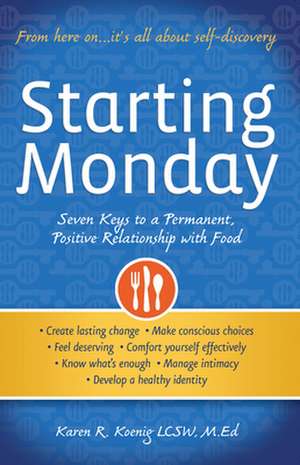

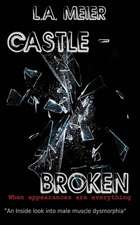
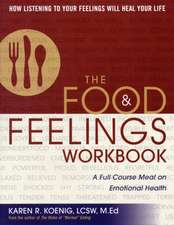
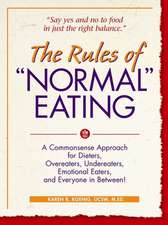


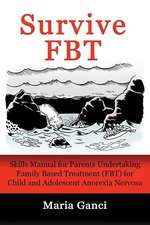
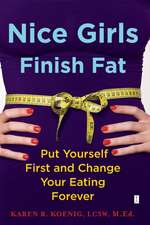
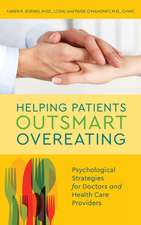


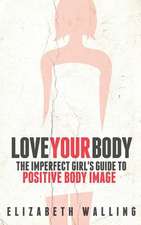
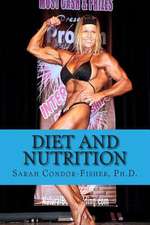

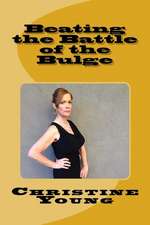
![Fantastic Art Design Coloring Books [Heart, Flowers, Variety Design]](https://i2.books-express.ro/bt/9781542701020/fantastic-art-design-coloring-books-heart-flowers-variety-design.jpg)
![Fantastic Art Design Coloring Books [Basic Flowers, Mandalas, Doogle Style]](https://i3.books-express.ro/bt/9781542701037/fantastic-art-design-coloring-books-basic-flowers-mandalas-doogle-style.jpg)
![Fantastic Art Design Coloring Books [Owls, Flowers, Variety Design]](https://i1.books-express.ro/bt/9781542701068/fantastic-art-design-coloring-books-owls-flowers-variety-design.jpg)
